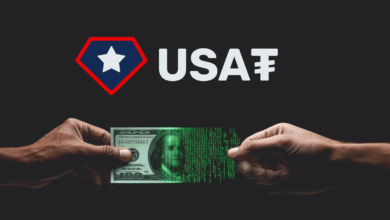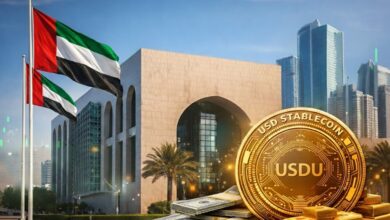The Shift of Financial Power: Why the Future of Digital Finance Runs Through the UAE
The Quiet Rebalance of Global Power

Financial power has always been cyclical. Empires once measured it in gold, nations later measured it in GDP, and markets measured it in dollars. But today, power in finance is being redefined — not by who holds the most money, but by who builds the most trusted systems. And few nations have understood that shift more clearly than the United Arab Emirates.
Across boardrooms, regulatory circles, and blockchain networks, a quiet rebalance is underway — a migration of financial gravity from legacy centers to a new hub built on credibility, innovation, and vision.
Before the Shift — When Finance Flowed One Way
For much of modern history, global finance moved through a single set of arteries: Wall Street, London, and the dollar. Emerging markets sought safety and access; Western systems offered both.
Capital flowed one way — from developing economies into the same few financial capitals. The world’s wealth was global, but its infrastructure was Western.
The Breaking Point of Traditional Power
Then the cracks appeared.
The 2008 financial crisis revealed fragility at the heart of the system. The weaponization of the dollar and rising geopolitical fragmentation pushed nations to seek new paths.
At the same time, blockchain technology introduced a radically different proposition — one where trust didn’t depend on intermediaries but on transparent code. The trust that once anchored traditional finance began to migrate — from institutions to innovation.
The UAE: From Financial Follower to Global Architect
While others debated, the UAE designed. It didn’t wait for consensus to emerge — it built the frameworks that would define it.
Dubai established the Virtual Assets Regulatory Authority (VARA), the first dedicated digital-asset regulator of its kind. Abu Dhabi’s ADGM expanded its Financial Services Regulatory Authority (FSRA) to govern tokenized securities, stablecoins, and blockchain-based finance. The Central Bank of the UAE went further, issuing its Payment Token Services Regulations, under which AEcoin became the first licensed stablecoin, and many to come!
As Omar Abbas, Co-Founder and CEO of BurjX, explains: “Most jurisdictions regulate digital assets reluctantly and reactively. The UAE took a different path. It understood early that regulation is the foundation for trust and long-term innovation. That’s why I moved my family here and built BurjX here. When you combine disciplined regulation with forward-looking vision, you build the future. And that’s exactly what’s happening in the UAE. It’s where the next generation of global financial institutions are being built.”
Abbas’s words capture what makes the UAE different — it doesn’t chase innovation, it institutionalizes it.
From Capital to Credibility — The New Financial Standard
Financial power today isn’t measured by reserves but by credibility. Nations that can regulate, attract, and mobilize digital capital will lead the next era of finance.
Here, the UAE’s advantage is clear: regulatory clarity, open markets, and geopolitical neutrality. It’s not trying to out-spend competitors — it’s out-organizing them.
Mazen Rasamny, Founder of Rasma Legal, describes this strategic leap: “Regulation is still finding its footing in a rapidly changing financial world, but the UAE has stepped up with real intent. Through initiatives like the Virtual Assets Regulatory Authority, the new Open Finance framework, and the Payment Token Services Regulations that streamline the fintech framework, the country is proving that smart regulation can be a competitive advantage. Its quick adaptation to emerging technologies is turning it into one of the most credible hubs in global finance.”
In a world where credibility is the new currency, the UAE is minting it faster than anyone else.
Tokenization: The Technology Powering the UAE’s Rise
Beneath this shift lies tokenization — the process of turning assets into programmable, borderless digital instruments. Tokenization doesn’t just digitize ownership; it redefines liquidity and access.
For the UAE, where banking strength meets digital ambition, tokenization represents a new form of liquidity sovereignty. It gives investors and institutions the ability to interact across asset classes seamlessly and compliantly — from real estate to trade finance to carbon markets.
Guillaume De La Tour, Council Member at the ADI Foundation, articulates it clearly: “The UAE is not just adopting blockchain, it’s architecting the financial infrastructure that others will build upon. By combining sovereign regulatory clarity with institutional-grade technology, the nation is defining the rails for a new, trust-based global economy.
Through initiatives like the Dirham-backed stablecoin and our ADI Chain that we are launching to the world from Abu Dhabi, the UAE is proving that the future of finance can be both decentralized and dependable.”
If the dollar defined the last century of finance, tokenization will define the next — and the UAE is already building its rails.
A Decade Ahead: The UAE as the World’s Financial Router
Looking ten years forward, the UAE’s ambition extends beyond being a financial hub — it’s becoming a router of global finance.
Its ecosystem of banks, regulated exchanges, and blockchain platforms is forming an integrated financial stack that can handle both fiat and tokenized assets. This is where compute meets capital — the infrastructure that will run the next wave of financial innovation.
As Hicham Chahine, CEO of NIP Group, observes: “The foundation of financial power is evolving. As economies become increasingly compute-intensive, the UAE stands out for recognizing that computing power is the new currency of progress. It’s not just enabling innovation — it’s shaping how value itself is created and secured.”
In tomorrow’s economy, computing power will be as strategic as capital — and the UAE is positioning itself at the heart of both.
The New Map of Money
The transformation is already visible. Every week, another global player strengthens its presence in the Emirates.
Tim Popplewell, CEO of Scintilla Network, captures this shift from policy to people: “It’s already happening. Every day brings news of another global player strengthening their presence here. The UAE has blended its role as a dependable global hub with a rare regulatory clarity that gives innovators the confidence to build. We’re proud to be part of this story, launching the world’s first exchange for tokenized assets in the coming months. But what’s truly driving this isn’t policy or hype, it’s people. It’s the shared belief that what we build here can make finance more open, more inclusive, and ultimately, more human.”
Power in finance no longer belongs to those who control the flow of money, but to those who design the systems that move it. The UAE understood this before most — and built for it.
What comes next won’t just redefine markets, but the meaning of financial leadership itself.




